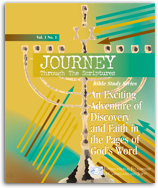
Journey Through The Scriptures
The Life of Jacob
Lesson 7: Jacob Goes to Egypt, Blesses His Sons, and Dies
(Scripture to Read: Genesis 46:1–7; 46:26–34; 48:1–22; 49:1–2,28–33)
Jacob had one more journey to make before he died. A famine in Canaan had forced Jacob to seek food in Egypt, where his "lost" son Joseph had risen to the second highest office. God wanted the family of Israel to go into Egypt, where they would grow into a mighty nation over the next 400 years.
The patriarchal blessing was an important feature of family life, and so Joseph sought Jacob’s blessing on his two sons, Manasseh and Ephraim. Jacob proceeded to give Ephraim the greater blessing, even though he was younger. This repeated the same pattern of previous generations in which the younger son was placed ahead of the older. It happened with Ishmael and Isaac, Jacob and Esau, Reuben and Joseph, and now with Manasseh and Ephraim. Jacob then blessed his own sons (read Genesis 49:3-27 for further study), and died in Egypt.
Study Questions
- Why did God appear to Jacob in a vision to reassure him of God’s blessing as the family left for Egypt?
- Since Joseph was the chosen son of his generation, why was it important for Jacob to know that Joseph was alive and well (Genesis 46:28–30)?
- In each generation of the patriarchs, God chose the younger, and presumably "lesser," son to rule over the older, and presumably stronger, son. What lesson can we learn from this fact?
- Jacob built a stone pillar at the place where he met with God and poured offerings on it, as he had done earlier (Genesis 28:18). Why was it important for Jacob to do this?
- Jacob instructed his family to bury him in the Promised Land. How did Jacob want even his burial to demonstrate his faith in God’s promises to Israel?
Something to Think About
We are often unduly influenced by people’s physical appearance and human status, but "the Lord looks at the heart" (1 Samuel 16:7) in choosing people He wants to bless.
Whether we realize it or not, the everyday choices we make help to reflect our confidence – or lack thereof – in the goodness and faithfulness of God.



